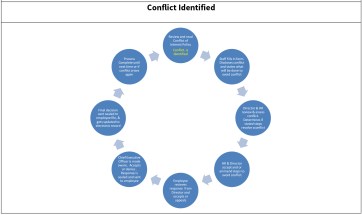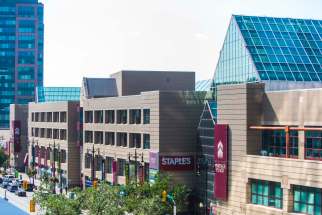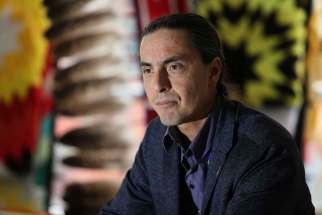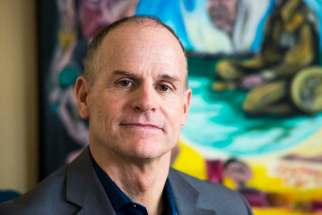PPC defined by anti-immigrant stance
Read this article for free:
or
Already have an account? Log in here »
To continue reading, please subscribe:
Monthly Digital Subscription
$0 for the first 4 weeks*
- Enjoy unlimited reading on winnipegfreepress.com
- Read the E-Edition, our digital replica newspaper
- Access News Break, our award-winning app
- Play interactive puzzles
*No charge for 4 weeks then price increases to the regular rate of $19.00 plus GST every four weeks. Offer available to new and qualified returning subscribers only. Cancel any time.
Monthly Digital Subscription
$4.75/week*
- Enjoy unlimited reading on winnipegfreepress.com
- Read the E-Edition, our digital replica newspaper
- Access News Break, our award-winning app
- Play interactive puzzles
*Billed as $19 plus GST every four weeks. Cancel any time.
To continue reading, please subscribe:
Add Free Press access to your Brandon Sun subscription for only an additional
$1 for the first 4 weeks*
*Your next subscription payment will increase by $1.00 and you will be charged $16.99 plus GST for four weeks. After four weeks, your payment will increase to $23.99 plus GST every four weeks.
Read unlimited articles for free today:
or
Already have an account? Log in here »
Hey there, time traveller!
This article was published 01/08/2019 (2322 days ago), so information in it may no longer be current.
For a party allegedly trying to distance itself from accusations of xenophobia, if not outright racism, the People’s Party of Canada isn’t exactly covering itself with glory.
PPC Leader Maxime Bernier and numerous candidates have made no secret they want Canada to decrease immigration. And while discussions of immigration limits and border protection are legitimate political conversations, the PPC leader has also said he is against a policy of multiculturalism — a defining element of the Canadian identity.
The immigration question, however, seems to be the thin edge of the PPC’s rhetorical wedge.

PPC candidate Jane MacDiarmid (Winnipeg South Centre) has said she dislikes the Liberal government’s handling of immigration and that it “has to be done the right way, and we have to bring the right people in that are going to support our country.” Ms. MacDiarmid has previously run as a candidate for the Christian Heritage Party, whose platform in 2017 included a “moratorium on immigration from any Sharia-based countries.”
Elsewhere, attitudes about the “right kind” of Canadians were shown in tweets from PPC candidates Jeff Benoit (Chateauguay-Lacolle) and Cody Payant (Carlton Trail-Eagle Creek).
In a since-deleted tweet, Benoit wrote, “We have to ensure that our children have a right to exist and to their identity. We have to ensure that our children have the right to access good jobs and not be limited to quotas and missed opportunities. This fundamental applies to all Canadians from coast to coast!”
The wording strongly echoes the infamous white supremacist slogan known as the “14 words”: “We must secure the existence of our people and a future for white children.”
Mr. Payant, meanwhile, tweeted out a photo collage of a Caucasian baby with bizarrely blue eyes, the Canadian flag and a mountain range, adding “PPC stands for the future of your kids.”
PPC stands for the future of your kids. @peoplespca #PPC2019 ���� pic.twitter.com/qdQ5RPn7bL
— ���� Cody Payant �� (@PayantCody) July 26, 2019
Meanwhile, Winnipeg South PPC candidate Mirwais Nasiri — himself an immigrant from Afghanistan — says he agrees with the party’s promise to reduce Canada’s annual immigration targets by more than 50 per cent. Mr. Nasiri, who works as a settlement facilitator for immigrants, says having fewer immigrants means we can better take care of them. One can’t help wonder if such a philosophy, had it been in place as official government policy, might have affected his arrival in Canada.
It’s safe to assume all the PPC’s candidates — since none appear to be Indigenous — are descended from immigrants. Throughout Canada’s history, many immigrant groups have experienced xenophobia, including the Chinese head tax levied in the late 19th and early 20th centuries, resistance to allowing Mennonites fleeing Stalinist purges in the 1930s to settle on the Prairies, the Japanese internment camps of the Second World War and perhaps most infamously, the turning away of Jews fleeing the Holocaust.
It’s safe to assume all the PPC’s candidates– since none appear to be Indigenous — are descended from immigrants
Canada’s policies on immigration and refugee acceptance have evolved over the decades. Under recent Conservative and Liberal governments, initiatives such as the provincial nominee program and the federal government’s response to the Syrian refugee crisis have added to Canada’s cultural mosaic — just as previous waves of immigrants and refugees have.
A strong indictment of the PPC’s platform came from within the party in July, when prospective Elmwood-Transcona candidate Willows Christopher and his riding board all quit, citing what they saw as bigotry against immigrants and the LGBTTQ+ community within the party’s ranks.
This much is clear: the unsettling statements are not mere gaffes. For the PPC, it seems xenophobia is not a problem; it’s part of the brand. And that’s not something Canadians should embrace.














